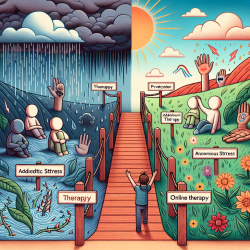Introduction
The COVID-19 pandemic has posed unprecedented challenges to mental well-being, particularly among university students. As practitioners in the field of speech-language pathology, it's crucial to explore interventions that can enhance mental health outcomes. A recent study by Geier and Morris (2022) highlights the positive impact of gratitude interventions on mental well-being during such crises. This blog aims to explore how these findings can be applied in educational settings, particularly in online therapy services like those offered by TinyEYE.
The Study at a Glance
The study, "The impact of a gratitude intervention on mental well-being during COVID-19: A quasi-experimental study of university students," involved 47 participants who engaged in weekly gratitude reflection journals over ten weeks. The results were statistically compared with a control group of 40 participants. The analysis revealed a significant increase in mental well-being among those who participated in the gratitude intervention (Cohen's d = 0.74), while the control group experienced a decrease (Cohen's d = -0.41).
Implementing Gratitude Interventions in Practice
For practitioners, integrating gratitude interventions into therapy sessions can be a valuable tool for improving mental well-being. Here are some practical steps to consider:
- Incorporate Gratitude Journals: Encourage students to maintain a gratitude journal, documenting things they are thankful for on a regular basis. This practice can be easily integrated into online therapy sessions.
- Facilitate Group Discussions: Create a safe space for students to share their gratitude experiences during group sessions. This can foster a sense of community and support among participants.
- Utilize Technology: Use online platforms to share gratitude prompts and facilitate virtual gratitude circles. This can be particularly effective in maintaining engagement in remote learning environments.
Encouraging Further Research
While the study provides promising results, further research is needed to explore the long-term effects of gratitude interventions across diverse populations and settings. Practitioners are encouraged to contribute to this growing body of research by conducting their own studies and sharing findings with the broader community.
Conclusion
Gratitude interventions offer a simple yet powerful tool for enhancing mental well-being, especially during challenging times like the COVID-19 pandemic. By incorporating these practices into educational settings, practitioners can support students in developing resilience and maintaining positive mental health. As we continue to navigate the complexities of remote learning and therapy, let us remain committed to data-driven approaches that prioritize the well-being of our students.
To read the original research paper, please follow this link: The impact of a gratitude intervention on mental well-being during COVID-19: A quasi-experimental study of university students.










